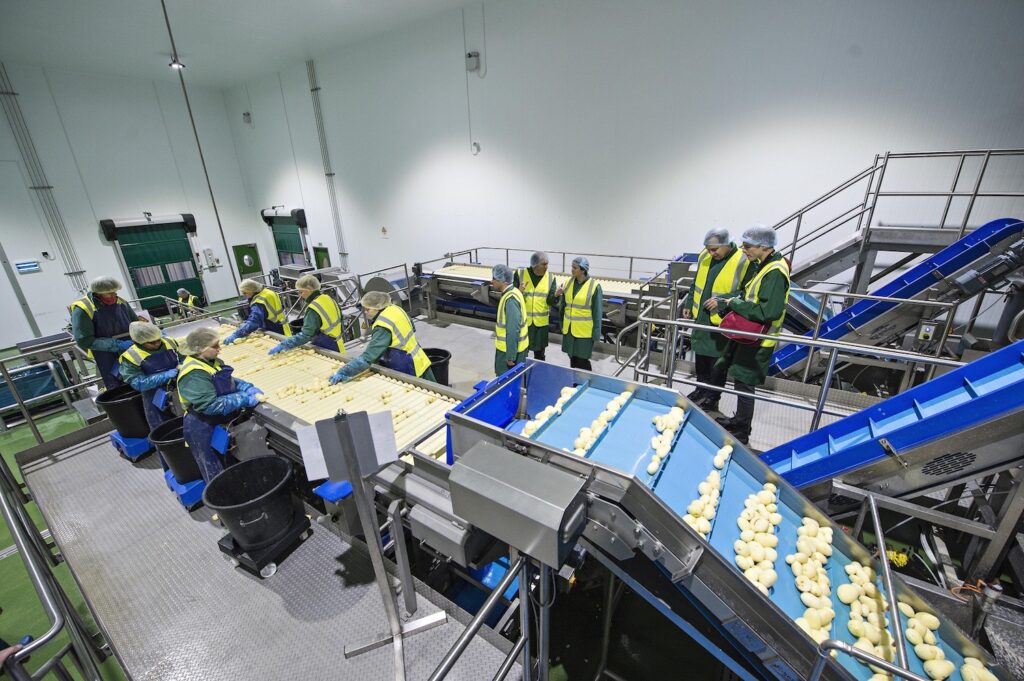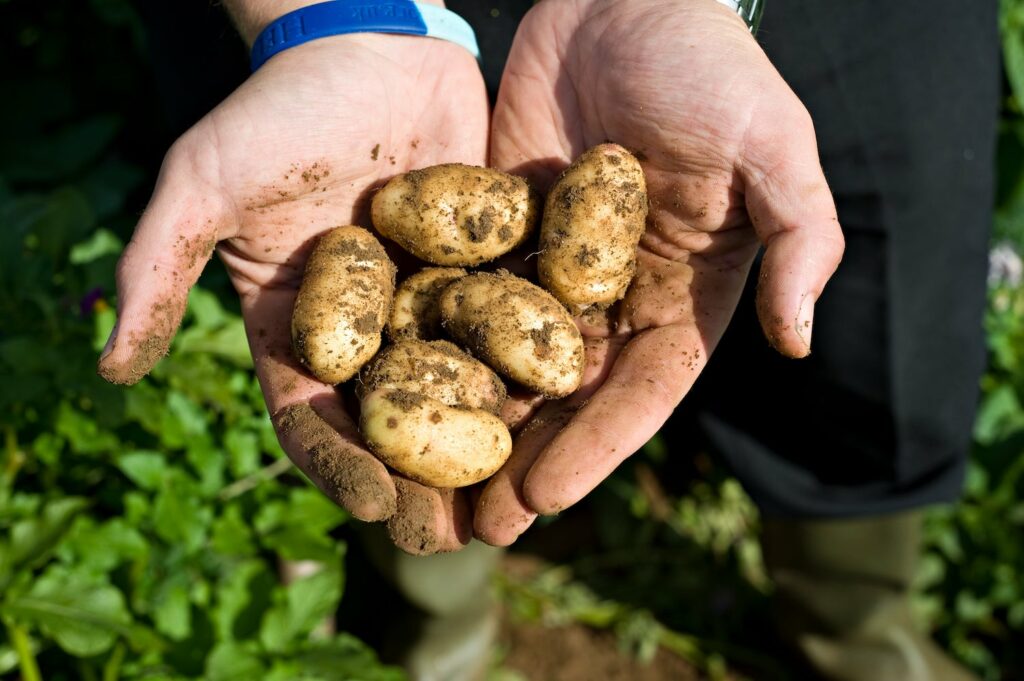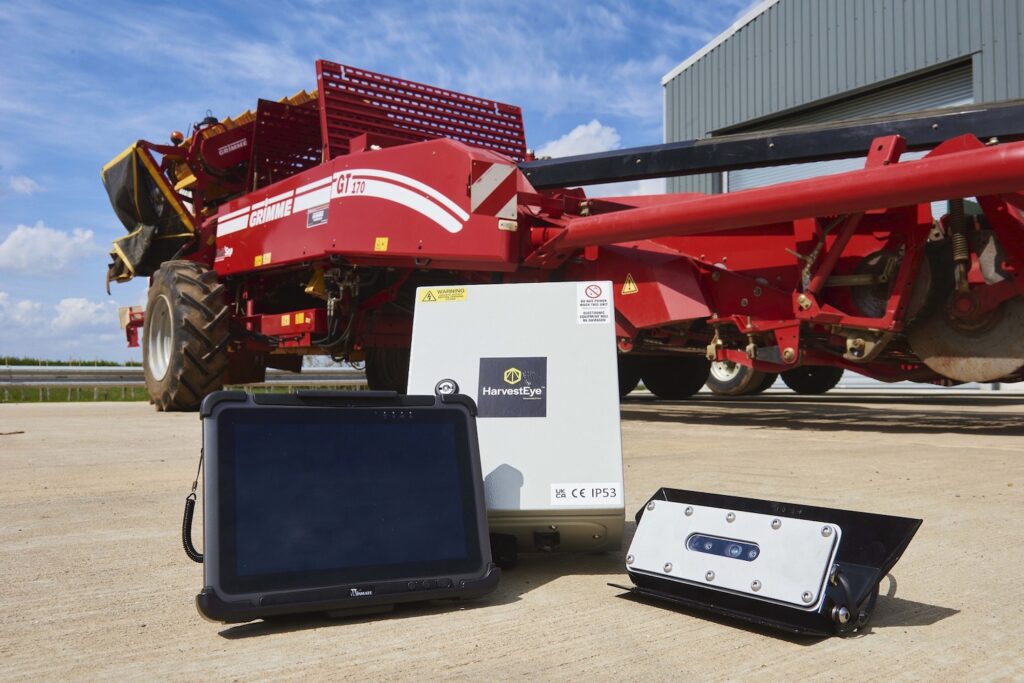From potato packing to R&D innovation: A career journey
5th January 2023
From hand-packing produce on the Branston factory production line to being promoted to general manager at HarvestEye, Charlie Flack’s 21 years of experience in food production spans a variety of positions. Here, he discusses how his role progressed from the factory floor to head office, his proudest achievements in the industry and where he sees the next key focuses for harvest technology.
Charlie has worked his way from the ground up within the food production sector and now works as general manager at machine-learning driven crop technology company HarvestEye. The company is based in Lincolnshire and deals with growers across the UK to deliver valuable root crop insights during the harvest season.
Tell us about your first role in the food production industry
My early working life was a bit of a mixed bag — I started out as a pine furniture maker. I joined the trade after leaving school and I worked there for seven years, before the company closed. So, at 23, I headed to national potato supplier Branston and asked for a job for a few weeks to keep me going.
I started working on the production line, packing potatoes into sacks and stacking them on a pallet. It was hard work, with no automation at that time, everything was done manually. Whilst it was quite physically demanding, I worked with some great people and there was a real spirit and camaraderie among us. We were all invested in what we were doing, and all worked hard as a team – ensuring Branston delivered product to our customers on time and to the right specifications.
Another good thing about working in any factory environment is that there are plenty of roles to grow into. So, if you’re willing to go the extra mile, it’s not hard to get noticed. Branston are really keen to promote from within, so from there I very quickly moved into machine operator roles. They’re always willing to provide opportunities and support someone who displays the right attitude and work ethic.
How did your career progress from there?
After working on the production line, I moved to supervising them, which gave me the first glimpse of operations management. From here, I had a big jump into overseeing the day-to-day running of the factory. As I moved up the ladder, I learned about food manufacturing, safety, food hygiene, processes and completed training in automation and production.
Eventually I moved into a process improvement role. Branston leadership and its customers were starting to analyse everything, and wanted to ensure production was lean and waste-free wherever possible, so I went on that journey with them.
I worked closely on efficiencies in the production process, looking at new ways of working and different machinery that could be utilised. That was where I started to develop my project management skills and look at costings on a bigger scale. I would fine tune the machinery setup, train people on how to look after the machinery and standardise everything across Branston’s Lincoln, Somerset and Perth factories.
Then in 2009 I took the opportunity to move into IT to help implement a new system in the Lincoln factory. I started as an IT project assistant and progressed to IT manager, installing new networks, delivering valuable customer service whilst further developing my management skills. Eventually, I expressed that I was ready for the next challenge, which is when I started as general manager at HarvestEye.

Branston Ltd. Photo: Andy Weekes.
What does your current role at HarvestEye involve?
I manage the day-to-day operations of HarvestEye. I work with everyone from the hardware engineering teams to the machine learning experts, helping our growers with live insights on their root crops as produce is lifted.
Customer service has been a big focus for me over the past few months. I’ve been developing our help desk system to monitor our systems and communicate better with our users. It’s all about making sure that we’re being proactive and going to our growers with the information that they need, rather than waiting for them to come to us. Harvest is a key time for them, and our technology is only growing ever more important as margins continue to feel the pressure across farming supply chains.
It’s important that we show growers the breadth of insights available with technology, and how they can be of benefit in crop utilisation, which in turn demonstrates the value of our system.
What is your proudest achievement?
Since I first started at HarvestEye, we’ve worked to continuously improve and develop our database and insights portal, making it as easy as possible for customers to get data out of the system. I joined around the middle of the busy harvest season, which was the perfect opportunity to witness the challenges first hand and identify opportunities to improve.
We have spent the last 12 months primarily focussed on being pro-active in delivering information and customer service to our clients.
A part of that strategy is proactively sending out data reports to growers, so the information conveniently lands in their inbox. They don’t have to wait around or log into the portal if they’re busy harvesting. Instead, we deliver it straight to them and we’ve had a really positive response to that – I’m very proud of how it’s progressed in the past 12 months.
How have you seen the industry change over the years?
I’ve had a variety of roles across several different areas of the food production process, and technological innovation has come on in leaps and bounds since I first started.
Nowadays, brands are constantly trying to reduce wastage, not just in terms of crops but their team’s time. Developments in machine learning and technology will help us do this, freeing up people’s time to develop new ways of working.
Finally, what would your advice be to people setting out on a similar career path?
I think being proactive is key, having the data is just the start, understanding how to communicate it to the people that need it and delivering it effectively is what’s crucial.
Also, understanding who needs to know what statistics is fundamental, that’s about taking the time to really understand the business and industry you’re working in.
For example, the perception of IT teams is that they are just there to fix your laptop when it’s broken, so it’s important to explain to people what you’re doing, and the value that you’re adding to their business. It’s important to engage with people and ask what you can do to make their lives easier, or their data more useful to them.
I think in general, teams need to shout more about what they’re working on and let the business know what’s happening in your department, and how that can help others around you and your customers. The farming industry is incredibly fascinating, and an important way to help it progress and develop, is with the innovation that teams such as us are presenting to growers. Both before they head into harvest season and pro-actively during it, so they can make informed decisions. I’d encourage anyone thinking of taking a role in our industry to get involved, you can make a real difference.
For more information about HarvestEye, visit https://www.harvesteye.com/.



